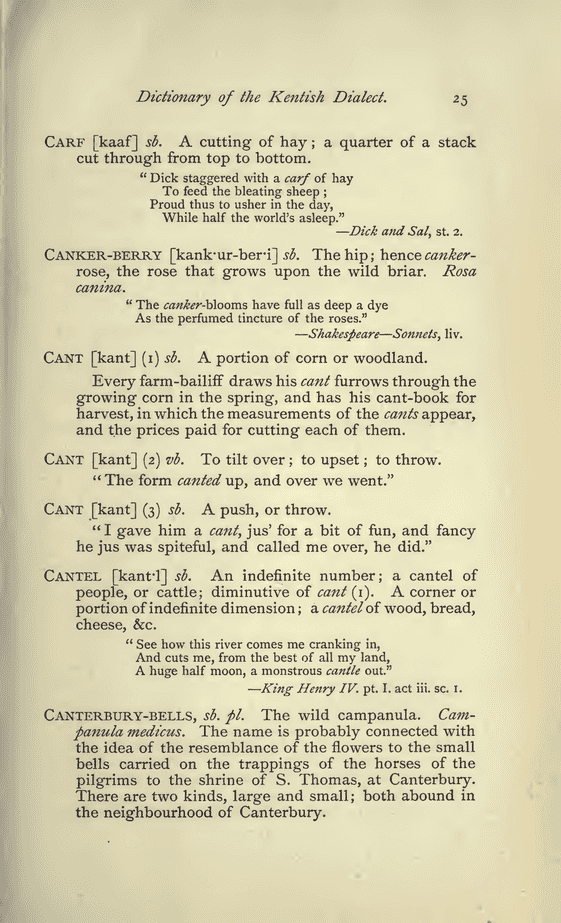Can
Source : Wright, Joseph English Dialect Dictionary
web : https://eddonline4-proj.uibk.ac.at/edd/main.html
CAN, v. In var. dial. of Sc. Irel. and Eng. Also in form con, see below. I. Grammatical forms.
- Present Tense. Sc. To the young that canna, the ald that manna, The blind that downa see, Jamieson Pop. Ballads (1806) Bonny Bee-Ho'm; Ye canna help me, Scott Midlothian (1818) vii. N.I.1 Neg. Canney. Nhb. I canna climb the knowes, sae green, Coquetdale Sngs. (1852) 100; Nhb.1 Ye canna say them nay, Mr. Mayor, Quayside Ditty (1816). Cum. What can t'e want wi' me? Gilpin Ballads (1874) 160; Cum.1 n.Cum. Canna, m.Cum. Cāan't, sw.Cum. Cāat. Wm. Canta tell Blezard Sngs. (1868) 18. m.Yks.1 Aa kaan· or kaanz·; dhoo kaan·, kaanz· or kaanst·; ey kaan· or kaanz·; wey, &c. kaan· or kaanz·, Introd. xlvi. w.Yks. Strong form kan; weak forms kən, kŋ. The weak form kŋ is mostly used in comb. with the pers. pron. Neg. kanət or kānt, Wright Gram. Wndhll. (1892) 147; w.Yks.3 Cannot is gen. used at length. Lan. Con ta walk reight? Hamerton Wenderholme (1869) ii; What con friends do? Brierley Layrock (1864) viii; Aw conno' wayve same as aw're use't, BRIERLEY Layrock iii; I canna' say, Harland & Wilkinson Flk-Lore (1867) 61. e.Lan.1 Cornd. s.Lan. Conno, Bamford Dial. (1850). Chs.1 Aw con; can ta? const; const ta? Neg. Conna, conner, connot; Chs.2 Connoh or conna. s.Chs.1 Sing. Kon, kost, kon, 90. Stf. Ye cawt die more nor once, Murray Nov. Note Bk. (1887) 54; Cossent see MURRAY Joseph's Coat (1882) 270. s.Stf. Thee cost goo now (T.P.). Der.1 Con, conno; Der.2 I conna' aboide hur. s.Not. I kaint do it (L.C.M.). Nhp.1 An endearing expression to children: Casn't do it? Nhp.2 I kaint do it. w.Wor. I conna mend it, S. Beauchamp Grantley Grange (1874) I. 30; w.Wor.1 Conna us? Shr.1 I can or con; thee ca'st; ca'st 'ee? canna we? can 'ee? cannad-a or canna they? Neg.: Thee cosna or casna; ca'sna thee [kas·nu'dhi']? If Tum conna or canna do it. Hrf.2 Casn, casna, canna. Thee casn'st lick me. Glo. Cass'net thee zing? Buckman Darke's Sojourn (1890) viii; Glo.1 Cas'n't; Glo.2 Cast or Cat? [canst thou]. Oxf.1 Thee cas'nt. Cas'nt do't? [kas·nt duot]. Brks.1 Casn't? Ess.1 Caint. Sus. Evers'much water caünt squench love, Lower Sng. Sol. (1860) viii. 7. Hmp.1 Thee cass'n. I.W.1 Thee casn't dout un. Canst? I.W.2 Casn't zee't? n.Wil. Gie out, cass'n! [Stop that, can't you!] (E.H.G.) Wil.1 Cass'n. Dor. Cassunt? (W.C.); [Thou] cast, Roberts Hist. Lyme Regis (1834); Dor.1 I'll bet A shillèn, that thee cassen, 129. Som. Thee cass'n do it, Jennings Dial. w.Eng. (1869) Gl. w.Som. Dhee kns; kuns dhee? Neg. Dhee kas-n, wee kaa·n; kas-n dhee? kaa·n uus? Elworthy Gram. (1877) 64; w.Som.1 Aay kn [emph. kan·] git au·n múd-leen-luyk tu dún·ur, búd aay kaa·n núv·ur maek noa an· tu braek·sus [I can get on middling-like at dinner, but I cannot ever make any hand of breakfast]; Ca's [thou canst] g'out ta-marra, if ee ool, Pulman Sketches, 17. Dev. 'Tis better thin ort a tal ulse thee kiss bring, Nathan Hogg Poet. Lett. (1865) Introd. n.Dev. Thee... cassent zee, Exm. Scold. (1746) l. 127; Thee kisn't think to ha' 'er, that's sartin, Rock Jim an' Nell (1867) st. 33. nw.Dev.1 Cas, cans, cas'n [thou canst, canst not, canst thou? canst thou not?]. e.Dev. Cas' thee milky? Pulman Sng. Sol. (1860) Notes, 4. Cor. Save thyself from transportation ef thee cust, Tregellas Tales (1860) 51; Cor.2 Cussn't, caan't; Cor.3 Kɐ̄s?
- Preterite. Sc. Cuid, cood. Neg. Cuidna, coodna, Murray Dial. (1873) 216; I couldna weel see, Scott Midlothian (1818) xv. Wxf.1 Aamezil cou no stoane [Myself could not stand]. m.Yks.1 Kuod· or kuodz·, sing. and pl., Introd. xlvii. w.Yks. Kud or kəd. Neg. Kudnt or kədnət, Wright Gram. Wndhll. (1892) 147. Lan. Ascroft couldna coom, Kay-Shuttleworth Scarsdale (1860) III. 79; Lan.1 pl. Cud'n. Der.2 I could na' insense him a no how (s.v. Insense). w.Wor.1 Cŏŏdna us? Shr.1 Thee cou'st; cou'st 'ee? we, &c. coulden. Neg. I couldna; thee couldsna; Couldnad-a or couldna they? Glo.2 Coos-nt? [Could you not?] Brks.1 Coost tell I which be the ro-ad to Alder, plaze? If I dwoant do't I be zure thee coos'nt. I.W.1 Thee coodsn't doo't, 50. Wil. Coos'n [could'st not], Slow Gl. (1892). Dor.1 Dost mind how once thee coossen zit? 63. Som. Coose do et eef oo'st [You could do it if you would], Pulman Sketches (ed. 1871) 87. w.Som. Dhee kuds (emphat. kèo·ds); dhee kèods·n, Elworthy Gram. (1877) 64. Dev. Cüdden 'er? Hewett Peas. Sp. (1892) 5; Es chudd'nt be a wafron, Madox-Brown Dwale Bluth (1876) bk. i. iv. e.Dev. Ai did leuke, but ai nivver ked vaine 'en, Pulman Sng. Sol. (1860) iii. 1. Cor.3 Cust lend me a shilling? II. In dial. usages.
- Used as infin., prp. or pp.: to be able. Sc. Thay hæna cuid geate eane [they have not been able to get one]. If wey hæd cuid cum. Ye'll can cum neist weik? Wi' hym noa cannin' fynd them [through his being unable to find them], Murray Dial. (1873) 216; He'll be grander than ever now ─ he'll no can haud down his head to sneeze, Scott Antiquary (1816) xxvi. Per. I'll no can bide lang, Cleland Inchbracken (1883) 137, ed. 1887. Fif. Ye'll no can work, Robertson Provost (1894) 155. s.Sc. A common idiom. Not known in Abd. (G.W.) Ayr. Baith you and her will can spare some o' the cost, Galt Sir A. Wylie (1822) xvii. Lnk. He'll can tell us, Wardrop J. Mathieson (1881) 32. Rxb. We'll... aiblins no can rise our lane, A. Scott Poems (1808) 43. Gall. In common use (A.W.). Nhb., Dur. He wouldn't could go. Will he can go? (J.W.H.) e.Dur.1 They'll not can get any food. I haven't could get across the doors (very common). ‘I doubt I'll not can get’ is one of the commonest phr. Cum.1 I'll nut can gang to-day. w.Yks. A ius tə kud or kəd diut [I used to be able to do it]. Ad ə dunt if id kud (never kəd) [I would have done it if I had been able], Wright Gram. Wndhll. (1892) 148; Ah can't walk five mile i' t'hahr nah, but ah used to could! Leeds Merc. Suppl. (July 2, 1892). Chs.1 Aw used to could a done it. Not.1 sw.Lin.1 Did you, when you used to could work? Lei.1 Nobody seems to can understand it. Shay'd use to couldn't sit nur stan'. A's the man to can du it. I'd use to could du it in hafe the toime, 31. War.2 He used to couldn't; War.3 Wor. I can't do it now, but I used to could (J.W.P.).
- In phr. (1) Can or can't awhile, see Awhile; (2) can't-help-it, a violent disinclination for work, &c. (2) e.Yks.1 A person is said to be troubled with a can't-help-it.
CAN, sb.1 Sc. Nhb. Yks. Not. Lei. War. Shr. Som. Cor. [kan, kæn.]
- Applied to any vessel, esp. of tin, for holding liquids or semi-liquids; a drinking cup. Sc. The term has a much wider range of meaning than in Eng., and is applied to almost every sort of vessel of metal, earthenware, or wood, e.g. the small tubs in which workmen mix and keep plaster, lime, &c. (Jam. Suppl.) n.Yks.1 e.Yks. A small milk-pail, with a handle on the side, Marshall Rur. Econ. (1788). w.Yks. Banks Wkfld. Wds. (1865); w.Yks.1; w.Yks.2 Drinking cups, called cans, are sometimes made [from the hollow of an elephant's trunk], w.Som.1 Kaar lau·ng dhu kan· lau·ng war ee [carry along the milk-pail along with you]. Cor. A great five gallon ‘can,’ Forfar Poems (1885) 73.
- A measure for liquids, holding about a gallon. Sh.I. (Jam.), Sh.&Ork.1
- The allowance of beer claimed by keelmen. Nhb.1 Every time they load a keel of coals from the staith, or ‘dyke,’ they get a ‘can,’ or allowance of ale equal in value to two shillings and sixpence, N. Tribune (1854) I. 210. Then went and drank wor can, Sng. Keel Row.
- The hollow part of an elephant's trunk. w.Yks.2
- A tin. Not.2 Buy me a can of meat.
- A broken piece of earthenware. Abd. (Jam.)
- Comp. (1) Can-bauk, a milkman's shoulder-yoke or ‘yoke-stick,’ q.v.; (2) Can-box, in wool-combing: a box full of pins or combs, through which the wool is passed; (3) Can-dough, a small oblong cake for breakfast bread; (4) Can-house, a public-house; (5) Can-leaf, Nymphaea alba, white water-lily; see Candock; (6) Can-money, money claimed by keelmen instead of an allowance of beer. (1) n.Yks.2 (2) w.Yks. (S.A.B.) (3) Shr.1 (4) Nhb.1 (5) Lei., War. The half unfolded leaves floating on the water [are] supposed to resemble cans. (6) Nhb.1
CAN, sb.2 Sc. Also written cann Abd.; kann Sh.I. Cleverness, ability, knowledge. Sh.I. (Jam.); Still in use. He has nae can (K.I.). n.Sc. (W.C.) Abd. These auld-warld fouks had wondrous can Of herbs that were baith good for man and beast, Ross Helenore (1768) 13, ed. 1812; Wi' mair wyles and cann they bet the flame, ROSS Helenore 15; Oor gran'-mithers believ't i' the can o' the fairies, Alexander Ain Folk (1875) 70, ed. 1882; He has gweed can amo' beasts fan he likes, ALEXANDER Ain Folk 93; Obsol. (W.M.)
CAN, see Cand, v.
CAN, sb.1 Stf. A pot made of china or earthenware. (M.F.)
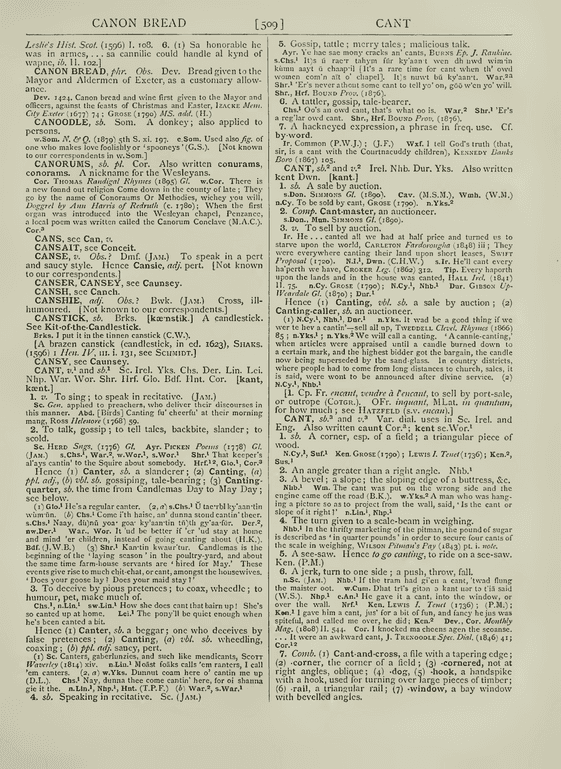
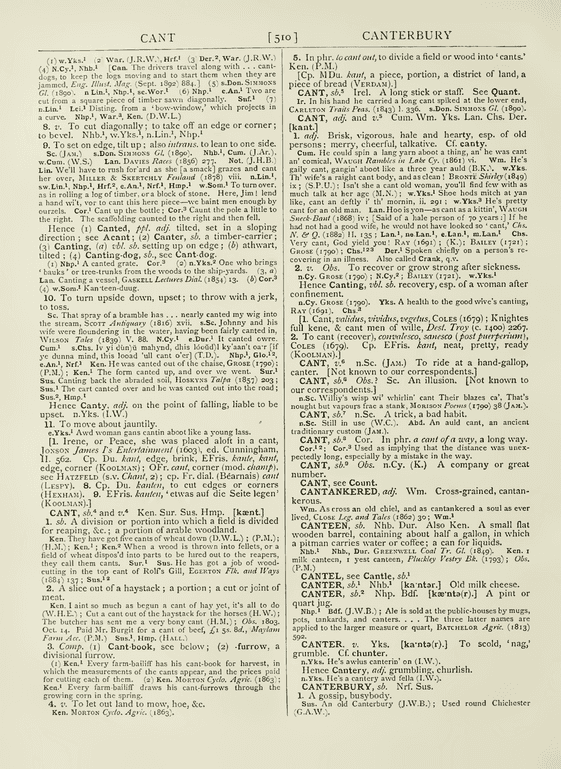
Source : Century Dictionary
web : http://triggs.djvu.org/century-dictionary.com/splash3.html
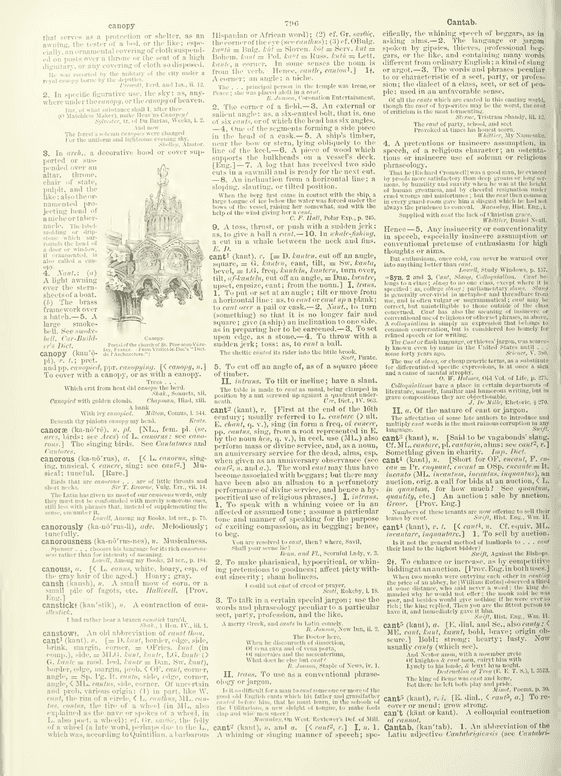
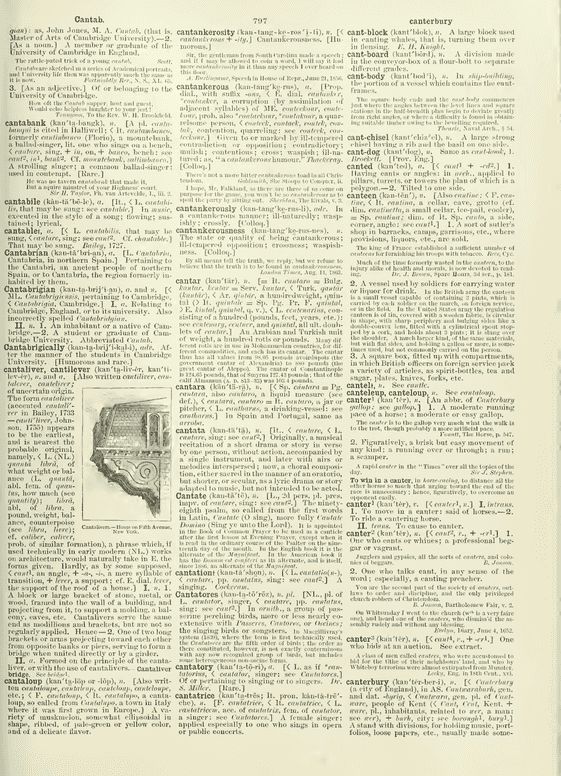
Source : A dictionary of the Kentish dialect and provincialisms in use in the County of Kent
